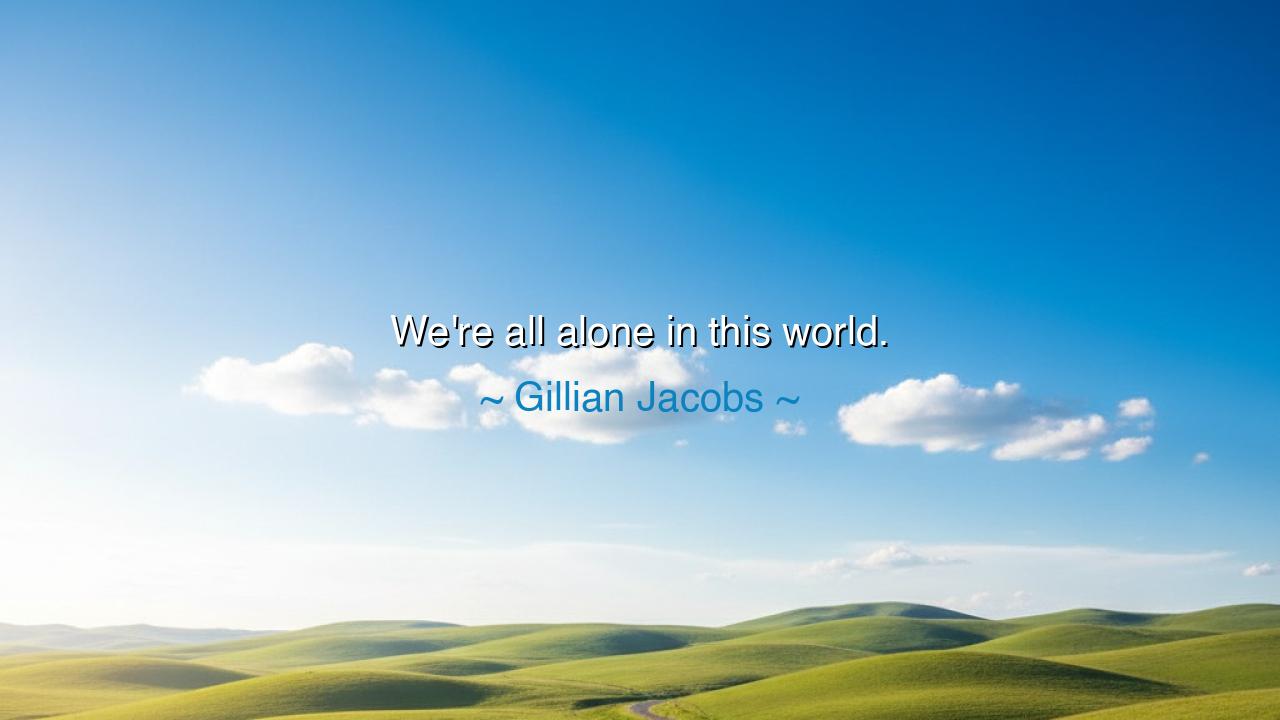
We're all alone in this world.






“We’re all alone in this world.” — thus spoke Gillian Jacobs, the actress and artist whose words, though simple, strike like a bell in the stillness of existence. Beneath their quiet sorrow lies a truth that humanity has whispered through the ages: that in the deepest sense, every soul walks its own path, unseen and unaccompanied, even in the midst of crowds. It is not a statement of despair, but of understanding — that aloneness is not merely the absence of others, but the inescapable condition of self-awareness. To live is to face oneself; to be human is to stand, ultimately, alone beneath the great and endless sky.
Gillian Jacobs, known for her depth of character both on and off the screen, has often spoken of the tension between connection and solitude — the paradox that defines the modern spirit. Her words come not from cold isolation, but from clarity, from the realization that no matter how closely we hold one another, we each bear an inner world that no hand can fully reach. The quote reminds us that friendship, love, and companionship are sacred, but they do not dissolve the boundaries of the soul. There is a part of each of us that remains untouched — our inner silence, our private thoughts, our unseen fears and dreams.
And yet, this truth is not cruel. To say that we are alone in this world is not to renounce love, but to revere it more deeply. For love, in all its forms, is made precious precisely because of our solitude. When two souls meet, they bridge an infinite distance — not to merge entirely, but to stand together, aware of each other’s separateness. To love someone, then, is to witness their aloneness and not be afraid of it. Jacobs’ words echo this wisdom: she does not lament isolation, but accepts it as the ground from which all genuine connection grows.
The ancients knew this truth well. Marcus Aurelius, the philosopher-emperor, wrote in his meditations, “Every man lives only in this present moment, and this moment is all that is granted to him.” He ruled an empire, surrounded by soldiers and statesmen, yet he knew that the weight of existence rests on the shoulders of the individual. Even surrounded by legions, the soul must bear its own burdens, make its own peace, and walk its own inner path. In this way, Jacobs joins the chorus of those who have dared to see solitude not as punishment, but as the inevitable mirror of the human condition.
Consider also the life of Vincent van Gogh, who wandered through loneliness deeper than most can imagine. He loved fiercely, painted endlessly, and reached toward others through color and light — yet he was often misunderstood, isolated in his vision. His art was born of solitude, and though he died alone, his soul now speaks to millions. His story shows us that even in aloneness, there is communion — not of bodies, but of truth and creation. The solitary life, when embraced with courage, becomes a bridge between one heart and the universal human spirit.
Gillian Jacobs’ reflection also carries within it a call to acceptance. We spend much of life fleeing from solitude, filling our days with noise, distraction, and false companionship. But the one who can sit quietly in their own presence, without fear, discovers an immense strength. To be comfortable with one’s aloneness is to master the art of inner peace. It is there, in silence, that one begins to understand the self — and through that understanding, one learns how to love without dependence, how to live without fear. The soul that embraces solitude walks freely among others, no longer demanding completion, but sharing abundance.
Lesson: Do not run from your aloneness. Instead, make it your teacher. Spend time in silence, without the need for noise or validation. Look within, and listen — not to the voices of the world, but to the quiet truth that dwells beneath them. When you learn to find peace in your own company, you will meet others not out of need, but out of choice; not to fill emptiness, but to share wholeness. For though we are all alone in this world, we are bound together by the very fact that each of us feels it — and in that shared solitude lies the deepest kind of unity.
Thus, Gillian Jacobs’ words endure as both reflection and revelation. To be alone is the fate of all who live, but it is also the freedom of all who awaken. Those who accept this truth cease to fear the silence, for they know that within it dwells both their truest self and the eternal companionship of all who have walked this same path before. We are alone — yes — but we are alone together, beneath the same stars, carried by the same mysterious light.






AAdministratorAdministrator
Welcome, honored guests. Please leave a comment, we will respond soon